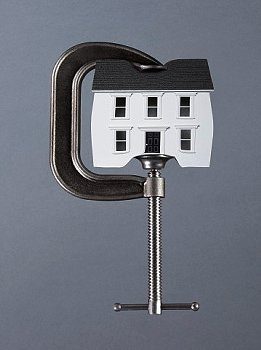Like my blog? Sign-Up for a FREE newsletter! OR Give a ‘Like’ to my FaceBook Page
 One of the most rewarding times in our lives is when we buy the home of our dreams. For most people, it’s the largest purchase and the longest loan commitment they’ll ever make. That’s why homeowners put so much effort into maintaining their property and are thrilled when the mortgage is stamped ‘paid-in-full’.
One of the most rewarding times in our lives is when we buy the home of our dreams. For most people, it’s the largest purchase and the longest loan commitment they’ll ever make. That’s why homeowners put so much effort into maintaining their property and are thrilled when the mortgage is stamped ‘paid-in-full’.
If you’re hoping to get out of your mortgage sooner, you’ll need to find ways to pay more. Your efforts will be rewarded not only with a reduction in the years you’ll be paying but savings in interest you would have paid over the course of the original agreement. However, there are two arguments against the move that you should consider before taking steps to increase your mortgage payments.
1. Paying down the principal will reduce the mortgage interest deduction for itemized federal tax returns. 2. Investing that extra money could potentially earn more than you’d save on your mortgage. While there are situations that warrant caution, for many people eliminating their mortgage is a bigger reward than a tax deduction or the potential earnings from any investment. Also, take into consideration the taxable nature of investments; and to be the better option, you’ll need to earn the same percentage as the interest you’ll save by paying your mortgage off early. The first step in paying down your mortgage is to call your lender and ask if prepayments are allowed without penalty. You don’t want to pay toward the principal and later find out you’ve been penalized for it. The sooner you begin paying more than the minimum payment, the more money you’ll save. With a new mortgage, extra money will go toward reducing interest; older mortgages will see it applied to the principal.
Strategies to use to pay down your mortgage
• Make monthly principal payments to see how a little extra goes a long way. Tacking even a small amount of money onto the principal each month can shave years off your mortgage. Make a permanent change in your budget to include the additional dollars to make the payment automatic.
• Making an annual principal payment may be an easier strategy to follow. Pay a larger chunk of money toward the mortgage once a year. Focus your attention on accumulating your tax refund, work bonuses, rebate checks, etc. to make a onetime payment to affect your mortgage pay off date.
• By making bi-weekly payments you will increase the number of payments and make one full extra payment each year. This approach is especially suited for those who are either paid weekly or bi-weekly because they can synchronize their mortgage payments to their pay schedule instead of the calendar.
• Refinance to a lower rate while maintaining the same payment amount and pay your mortgage off sooner.
• Claim all deductions and use the increased take home pay to add more to your mortgage payment.
No matter how small an extra payment is, putting it toward your mortgage will move you a bit closer to seeing ‘paid-in-full’ stamped on your loan papers. Even if you can’t follow a set schedule to make extra payments, every little bit will help. Successfully cutting the length of your mortgage will free up money that can be invested or used for travel or other things you enjoy.
About The Author: Noreen Ruth is a popular writer for numerous blogs and financial websites. Hoping to educate consumers, she uses government and other reputable sources to provide up-to-date, relevant news on credit, credit card deals, debt, debt relief services and other finance related topics. She stays current on the latest legislative actions that may affect a consumer’s ability understand credit card applications, apply for credit, money management services, etc.
